
Coast Guardsman transports radio reporters detailing the flood’s devastation. Ohio, 1937 | U.S. Coast Guard | Public Domain
How can we fight climate change through culture? That is the question raised in the second edition of the Cultural Innovation International Prize, which aims at stimulating initiatives that offer imaginative solutions to one of the most decisive problems of the 21st century. The 10 projects that have been shortlisted are a good sample of the diversity of ideas with which to tackle this challenge. As a whole, all the proposals we received also help us identify some of the general trends in the struggle against climate change.
In each of its editions and by choosing different themes, the Cultural Innovation International Prize seeks to work as a means to identify, accelerate and give visibility to the new state of cultural production. On this occasion, the large number of proposals received, their quality and their level of elaboration are an indication of the relevance that climate change has acquired on a global level. This relevance is further evidenced by the fact that many of these initiatives are already underway, and some have a long trajectory.
The 2nd edition of the prize had 218 entrants, which represent, given that many project proposals were written collectively or by associations, over 500 people from 59 countries.
Once a technical commission of CCCB staff has assessed the proposals, 10 projects have been shortlisted as finalists and will now be considered by an international jury. The winning proposal will be developed as part of the After the End of the World exhibition, which together with Debate de Barcelona, SoyCámara and our educational programme, will complement the programme prepared by the CCCB for the year 2017-2018 on such a decisive and crucial topic.
10 Proposals for the Anthropocene
<3 Earth
This project entails the creation of an experimental exhibition space that combines the physical and symbolic construction of climate change with performative actions. Through talks, meetings, theatre and multi-disciplinary events, it seek to create a contemplative dimension and to foster the public’s critical thinking. The project’s activities will also touch on the effects of climate change, the current policies to stop it and the difficulties of understanding such a vast issue. The members of the collective are Xisi Sofia Ye, Max Grosse, Marc Salicrú, Victor Ruiz, Anna Serrano, Elena Martín, Román Cadafalch, Adrià Botella and Albert García-Alzórriz.
Eat Drink Spill Hope
Teresa Borasino delves deeper into one of her lines of work to explore a new dietary model that relies on regenerative agriculture, fair distribution and commercialisation, and a diet based on local products that have a positive impact on the environment. All this investigation is formalised in the elaboration of a recipe book that will serve as the basis to give workshops and cooking lessons. The project concludes with a performative dinner ands seeks to foster reflection on how consuming certain foods can impact an ecosystem.
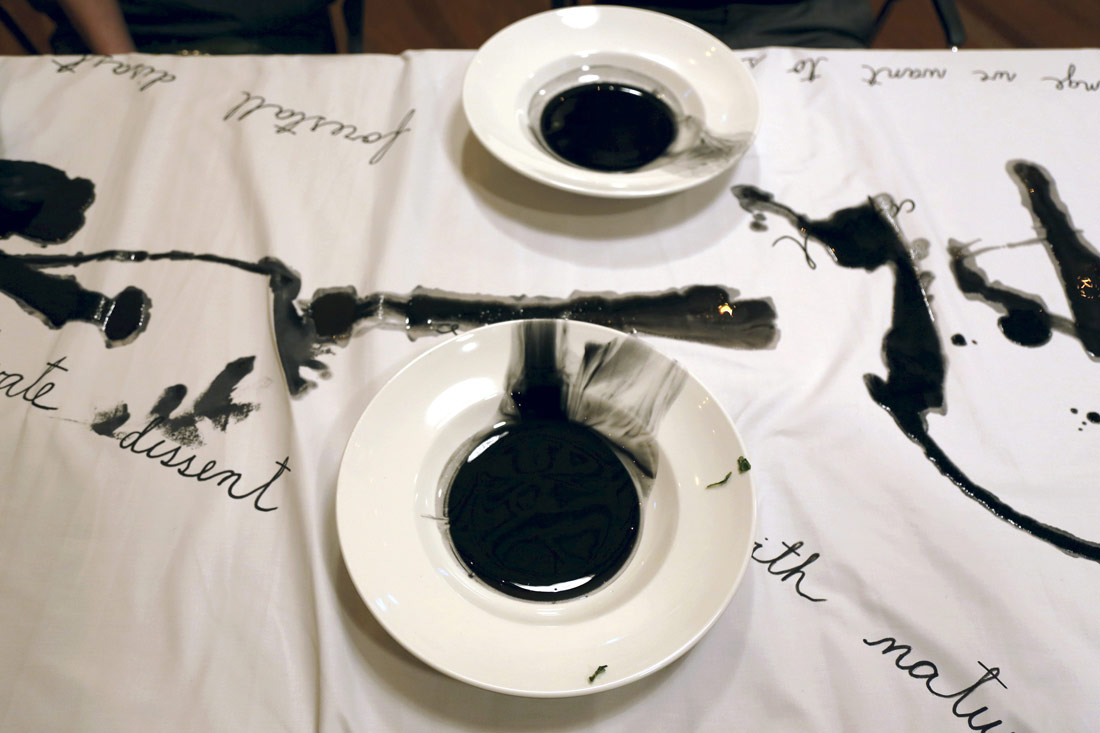
Eat Drink Spill Hope
Estrategias postdigitales para el antropoceno (Postdigital Strategies for the Anthropocene)
Sandra Álvaro and Ramón Sangüesa’s goal is to bring forth a posthumanist vision of the Anthropocene, thus establishing a new relationship between institutions, audiences and the technological environment. Through a series of workshops, they seek to provide the public with a set of tools that can empower them to obtain and interpret data and, ultimately, to use the results critically and operatively to promote ways of understanding, narrating and acting in this geological era in which we are all involved.
Hoy es un día cualquiera, a mediados de 2030 (Today’s Just Like Any Other Day, in the mid 2030s)
The collective formed by Víctor González, Lorenzo García-Andrade, Leticia Ybarra, Carlos Gárate, Virginia Lázaro and Eloy Vicente coordinates a cross-disciplinary cultural programme to address the planet’s ecological crisis through activities that reflect on the everyday life in the year 2030, the deadline to achieve the Sustainable Development Goals. The project organises an open call for an exhibition, talks, conferences, performances, participative activities and workshops to address climate change and serve as a call to action.
La Ruleta Gaia (The Gaia Roulette)
The Laboratorio de Pensamiento Lúdico collective suggests a collective game to generate speculative futures regarding the evolution of the planet and the organisms living in it. The project presents itself as a participative installation based on a casino roulette, which imitates our environment on a time and space scale. By playing games, a series of stories about the future of our planet will be created. The members of the collective are Estel Cristià, Raúl Herrera, Constanza Mendoza, Rubén Moldes, Antonio R. Montesinos, Susana Rodilla and Christina Schultz, with the advice of Andri W. Stahel.
Oda al futur (Ode to the Future)
This group project puts forward a series of workshops and conferences to give visibility to the evidences of acceleration in six points of Catalan geography where the consequences of climate change are already felt. Activist groups that work in these landscapes (named Odes after the Catalan acronym ODA, “Obrador de Dissidència Activista” or “Activist Dissidence Atelier”) coordinate themselves with three other groups to materialise their efforts and to display sensitive landscapes through essays, performances, theatre, graphics and mobilisations. The proposal is presented by Daniel Barbé Farré, Annelies Broekman, Rafael Diez, Josep Ribera, Jordi Huguet, Núria Vidal, Susanna Abella, Sergi Solà, Ramon Gabarrós, Carme Torrent, Jordi Mas, Marian de la Chica, Ariadna Serrahima, Diego Bustamente and Katharina Hetzeneder, together with the organisations Xarxa per una Nova Cultura de l’Aigua, L’Automàtica, Can Batlló, Oficina de Disseny, Grup de Defensa del Ter, Plataforma de Defensa de L’Ebre, Martorell Viu, Prou Sal and Paisatges Inestables.
The Apocalypse Project
The Philippine artist Catherine S. Young has been working on this project since 2013, generating year after year new experiences and reflections. Together with scientists and engineers, she speculates about future environmental scenarios and analyses the consequences of climate change in different areas: natural catastrophes and climate refugees, smells that will disappear, future foods and diets, clothing styles, etcetera. The different experiments and installations will be complemented with workshops and collaborative educational activities.
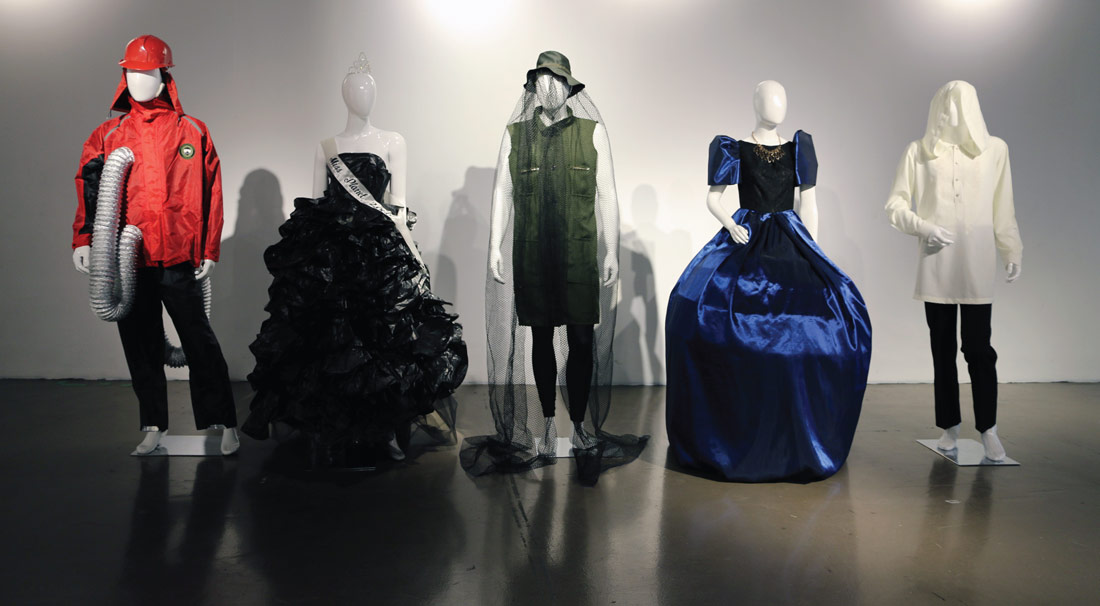
The Apocalypse Project
The Newton Machine
James Auger and Julian Hanna (Madeira Interactive Technologies Institute, Portugal) and Laura Watts (IT University of Copenhaguen, Denmark) in collaboration with Community Energy Scotland, try to develop a prototype for batteries that use gravity to store renewable energy. The investigation explores the specific needs of local communities with the aim of helping them achieve clean and free energy self-sufficiency. The project has three stages: an experimentation laboratory, a live laboratory to work on prototypes, and a workshop in which the project coordinators will present their entire experience.
Upcycling de Barri (Neighborhood Upcycling)
Marc Benito and Aniol López are members of the Taller Esfèrica collective and explore the benefits of a circular economy and of managing plastic waste on a domestic and local scale. Following the philosophy of initiatives such as Precious Plastic, they suggest creating a meeting space with three main goals: practical environmental education, the development of products that are compatible with a circular resource management, and the micromanagement of plastic waste.
We Are All Climate Refugees
What would the world look like if we had the chance to see it from the perspective of a climate refugee? The BeAnotherLab association, through “The Machine to Be Another”, has created a system that combines virtual reality, performance art and neuroscience methodologies to provide the user an immersive experience with sensorial empathy. On this occasion, they use their machine to make two VR documentaries with which to experience first-hand what it means to be a climate refugee.
Trends and Pathways
Although many of the projects that participated in the Prize are oriented towards raising awareness about climate change and the current situation, we can observe among them certain trends that go beyond their educational purpose. These initiatives explore traditional practices that had been abandoned in favour of capitalist production and consumption methods, they formulate prototypes, they develop proposals to be one step ahead of future problems and they carry out futurology exercises where speculative design predominates. Taken as a whole, the projects enable us to draw some conclusions:
- The number of international participants confirms that there is increasing awareness on a global scale.
- The collectives participating organise themselves in close collaboration between artists, scientists, designers, cultural managers, activists, etc., proving that this kind of initiatives help build bridges and encourage communication between different professions and disciplines.
- The projects focus on different goals and issues, which emphasises that the consequences of climate change will impact all aspects of human life and that our everyday decisions leave a lasting footprint on our surroundings.
- Format hybridisation is a general trend, with most proposals following the lines of the Prize’s previous edition: encouraging the public’s participation with thought-provoking proposals, like gamification, as an alternative way to spread awareness and knowledge.
In addition, the projects allow us to catch a glimpse of the paradigm (or paradigms) shift that was already foreseen in the previous edition of Kosmopolis:
- A philosophical change that brings forth a renewed critique of anthropocentrism and expresses the need for a new Copernican turn: we are neither the centre of the universe nor the measure of all things.
- A radical change of sensitivity towards the animal and vegetable kingdom, supported by science and by those disciplines that show the sophistication and complexity of non-human intelligence.
- A change in the ways we face the Anthropocene, articulated in the creation of narratives that transcend nihilist and dystopian views.
Climate change is among us and it is here to stay, but the cultural initiatives and proposals that participated in this edition of the Cultural Innovation International Prize show us that there are methods and strategies with which to raise awareness and educate about its origins and, above all, about the ways to deal with its consequences. And they do so without falling into despair, cynicism or nihilism.
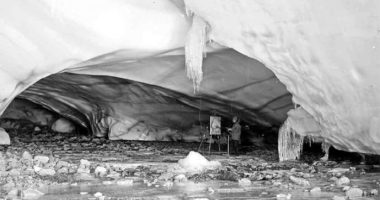
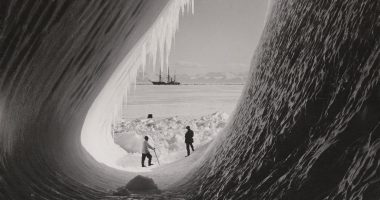
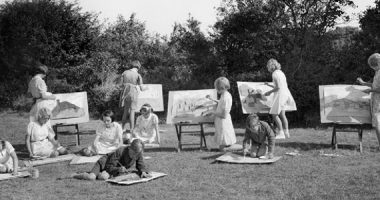
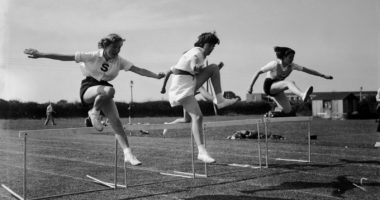
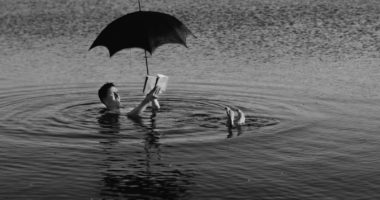
Leave a comment